Denis-Benjamin Viger
Denis-Benjamin Viger (French pronunciation: [dəni bɛ̃ʒamɛ̃ viʒe]; August 19, 1774 – February 13, 1861) was a 19th-century politician, lawyer, and newspaper publisher in Lower Canada, who served as joint premier of the Province of Canada for two years. A leader in the Patriote movement, he was a strong French-Canadian nationalist, but a social conservative in terms of the seigneurial system and the position of the Catholic church in Lower Canada.
Denis-Benjamin Viger | |
|---|---|
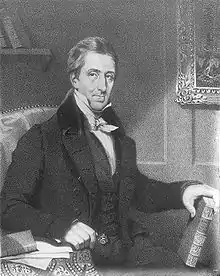 Denis-Benjamin Viger by Théophile Hamel | |
| Joint Premier of the Province of Canada (Canada East) | |
| In office 1843–1846 | |
| Monarch | Queen Victoria |
| Governors General | |
| Preceded by | Sir Dominick Daly (acting) |
| Succeeded by | Denis-Benjamin Papineau |
| Member of the Legislative Assembly of Lower Canada | |
| In office 1808 – 1829 (three different electoral districts, eight elections; for details, see succession box at end of article) | |
| Member of the Legislative Council of Lower Canada | |
| In office 1829–1838 | |
| Personal details | |
| Born | August 19, 1774 Montreal, Old Province of Quebec |
| Died | February 13, 1861 (aged 86) Montreal, Canada East |
| Spouse | Marie-Amable Foretier (d. July 22, 1854) |
| Relations |
|
| Occupation | Lawyer, journalist, landowner |
| Signature | |
| Military service | |
| Allegiance | British Empire |
| Branch/service | Lower Canada militia |
| Years of service | 1803–1824 |
| Rank |
|
| Battles/wars | War of 1812 |
Viger came from a well-connected middle class family. Trained as a lawyer, he invested in land and gradually became one of Montreal’s largest landowners. He held public office for most of his adult life, often working alongside his cousin, Louis-Joseph Papineau, a fiery nationalist. From 1808 to 1829, he was a member of the elected Legislative Assembly of Lower Canada, then from 1829 to 1838 he was a member of the appointed Legislative Council, the upper house of the Lower Canada Parliament.
Imprisoned during the Lower Canada Rebellion in 1838, he was subsequently elected to the Legislative Assembly of the Province of Canada in 1841. From 1843 to 1845, he served as a joint-premier of the province, which triggered criticism from his former party colleagues. He was later appointed to the Legislative Council of the Province of Canada, serving from 1846 to 1858.
In his later years, Viger lived quietly in Montreal, surrounded by his well-stocked library. He remained fond of entertaining, and his wine-cellar was said to be the best in Montreal. He died in 1861, at the age of 86.
Early life and family
Viger was born in Montreal to Denis Viger and Périne-Charles Cherrier, daughter of François-Pierre Cherrier, a merchant and notary.[1][2]
The Viger family was part of a rising middle class. Denis-Benjamin's grandfather, Jacques Viger, had been a shoemaker. Denis-Benjamin’s father, Denis Viger, began as a carpenter, branched out into small construction projects, and then developed a business selling potash to English markets. Denis Viger represented the electoral constituency of Montreal East in the Legislative Assembly of Lower Canada from 1796 to 1800. Denis Viger's two brothers, Jacques Viger and Joseph Viger, were also members of the Assembly. Jacques' son Jacques Viger fils (cousin to Denis-Benjamin), became the first mayor of Montreal.[1][2][3]
Through his mother, Denis-Benjamin was related to the Cherrier and Papineau families: Louis-Joseph Papineau, the future leader of the Parti patriote, was his cousin, as was Jean-Jacques Lartigue, future Bishop of Montreal. In 1801, Denis-Benjamin's parents took in one of his cousins, Côme-Séraphin Cherrier, aged three when his mother died, and raised him in their family. Côme-Séraphin was later elected to the Assembly as well.[1][2][3]
In 1782, Viger's father sent him to the Collège Saint-Raphaël, run by the Sulpician order. He had no difficulty in completing his studies. Upon graduation, he trained in the law from 1794 to 1799, first under Louis-Charles Foucher, the solicitor-general for the province, then under Joseph Bédard, brother of the leader of the Parti canadien, and finally under Jean-Antoine Panet, the speaker of the Legislative Assembly. In addition to learning the law, he learnt about the allure of politics, coupled with a commitment to public service.[1]
Viger joined the militia as a lieutenant in 1803. By the time of the War of 1812, he was a captain. Like many other French-Canadians he fought alongside English-Canadians against the Americans. He retired from the militia in 1824 with the rank of major.[1][2]
In 1808, Viger married Marie-Amable Foretier. They had one child who died in infancy in 1814. Throughout her life, Marie-Amable was involved in charitable activities, focussing on the underprivileged. She was a founder of the Institution pour les Filles Repenties, and was president of the Orphelinat Catholique de Montréal. Marie-Amable was the daughter of Pierre Foretier, a seigneur who had a well-established business in connection with the fur trade. When he died in 1815, Marie-Amable became an heir to his estate, but the estate was tied up in litigation for twenty-five years. It was not until 1842 that Marie-Amable finally obtained her father's seigneurie on Île Bizard, one of the Montreal islands.[1][4]
Legal career, journalism and landholdings
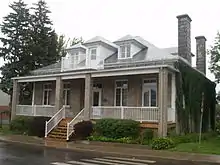
Viger entered the legal profession in 1799. Although skilled in the law and idealistic, he lacked charisma or personal presence. As time went on, he became very comfortable financially, but it is not clear how much of that came from his legal practice, and how much from land investments. He bought land and houses himself, and in 1823 inherited substantial land holdings from his parents, becoming one of the most important landowners in Montreal. At one point he donated a plot of land to his cousin, Jean-Jacques Lartigue, Bishop of Montreal, for a new building. There was some malicious gossip that the donated land was close to many of his other landholdings, which would likely increase their value as a result.[1][2]
Even before he completed his legal studies, Viger began writing articles on political issues for the newspapers, with the first appearing in 1792 in the Montreal Gazette. He gradually acquired financial interests in other newspapers, including the Canadian Spectator, La Minerve and L'Ordre. He owned some newspapers outright, particularly La Quotidienne and Le Temps. His writings at this time indicated an early interest in political issues, taken from an intellectual point of view. He was also an enthusiastic book-buyer, focussing on law and politics, but he was not very interested in fiction.[1][2]
Lower Canada politics
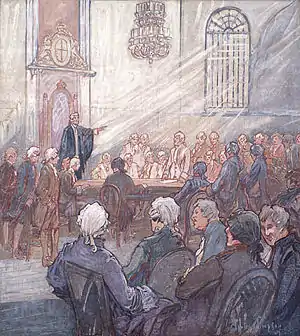
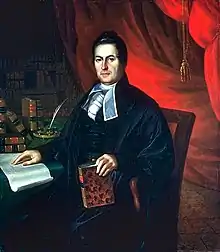

In 1804, at age 30, Viger entered electoral politics, unsuccessfully contesting a seat in Montreal. Four years later, in 1808, he was elected to the Legislative Assembly of Lower Canada from Montreal West, and was re-elected in 1809. He was elected in Leinster county in 1810 and 1814, and then regularly elected in Kent county from 1816 until 1827, until appointed to the Legislative Council of Lower Canada in 1829.[2]
Viger's cousin, Louis-Joseph Papineau, was also elected for the first time in 1808. Papineau was much more dynamic and charismatic than Viger, who was considered retiring and not eloquent. The two worked together, allying themselves with the Parti canadien. They followed the older leaders of the party, first Pierre-Stanislas Bédard, later James Stuart. Eventually, Papineau became the undoubted leader of the parti, as it developed into the Parti patriot. Viger helped to develop the intellectual framework for the party.[1][2]
Viger was a strong admirer of the British constitution, which he considered was an excellent balancing of the royal, aristocratic, and popular elements of the country. Socially conservative, he was distrustful of the various constitutional developments in French, and did not consider American republicanism as an option, unlike his cousin Papineau. He believed that French-Canadian culture and existence was threatened by immigration from the United States and from Britain.[1][2]
The Parti canadien was focussed on obtaining greater control of the government for the elected Legislative Assembly, and weakening the authority of the appointed Legislative Council and ultimately, the governors, appointed by the British government. They tried different tactics at different times. Under Bédard, the party challenged the Assembly's lack of control over public finances. Stuart brought impeachment hearings against some of the judges who also held positions in the Legislative Council and the Executive Council. When Papineau became Speaker in 1815, he continued the financial tactics, along with a trend towards developing nationalist arguments for French-Canadian control. He also worked on outreach to English-speaking politicians who shared concerns over popular control over public finances, such as John Neilson, who worked closely with Papineau.[1]
Viger was one of the leaders of the party, and was involved in developing its tactics and ideology. In the Assembly and its committees, he defended the seigneurial system, the use of the customary law of Paris in Lower Canada, and the Catholic church. When his cousin, Jean-Jacques Lartigue, became the first Bishop of Montreal, Viger supported Lartigue in a dispute with the Sulpician order. Viger later acted as a go-between for his two cousins, Lartigue and Papineau, when tensions rose between the church and the Parti canadien in the lead-up to the Lower Canada Rebellion in 1837.[1][2][6]
In 1822, an issue arose which united most Lower Canada political groups. The British government proposed to unite Lower Canada with Upper Canada into a single province. Papineau and Viger organised opposition to the proposal, with local committees meeting to pass petitions against union. Viger was so heavily involved that opposition to union became known as "Vigerism". Papineau and Neilson were then chosen to be envoys to London, to make the opposition to union known to the British government. They were successful, and the union proposal was shelved.[1][2]
Six years later, in 1828, there was another delegation to London. Papineau and the Parti canadien had continued to press for greater control of the public finances by the Legislative Assembly. They adopted the same tactic of popular meetings and petitions in support of greater financial control. This time, the delegation to London to press their demands was composed of Neilson, Viger, and Austin Cuvillier, armed with petitions with more than 80, 000 signatures. They had a favourable reception, as reform movements were growing in Britain. The three delegates appeared before a parliamentary committee, which gave a favourable report.[1][2]
The next year, Viger was appointed to the Legislative Council of Lower Canada, the appointed upper house.[1][2]
Role in the Rebellion

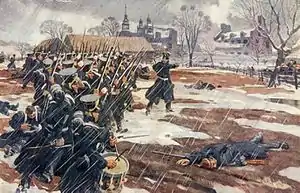
Prominent in the Patriote movement and denounced as the owner of seditious newspapers, Viger was imprisoned in 1838 when martial law was imposed in Lower Canada; refusing to post bail in protest of the repressive martial law and demanding a regular trial, he was not released until May 1840.
Province of Canada politics
.jpg.webp)
In 1841, he was elected to the Legislative Assembly of the Province of Canada representing Richelieu. From December 12, 1843 to June 17, 1846 he was one of the Joint Premiers of the Province of Canada. He was elected in a by-election to represent Three-Rivers in 1845 but resigned in 1847. He was appointed to the Legislative Council in 1848 but lost his seat for non-attendance in 1858. Viger died in Montreal in 1861.
Works
- Considérations sur les effets qu'ont produit en Canada, la conservation des établissemens du pays, les moeurs, l'éducation, etc., de ses habitans [...] (Montréal, 1809)
- Analyse d'un entretien sur la conservation des établissements du Bas-Canada [...] (Montréal, 1826)
- Considérations relatives à la dernière révolution de la Belgique (Montréal, 1831)
- Observations sur la réponse de Mathieu, lord Aylmer, à la députation du Tattersall, [...] sur les affaires du Canada [...] (Montréal, 1834)
- Observations de l'hon. D.B. Viger, contre la proposition faite dans le Conseil législatif [...] de rejeter le bill de l'Assemblée, pour la nomination d'un agent de la province (Montréal, 1835)
- Mémoires relatifs à l'emprisonnement de l'honorable D.B. Viger (Montréal, 1840)
- La Crise ministérielle et Mr. Denis Benjamin Viger [...] (Kingston, Ont., 1844).[2]
See also
References
- Fernand Ouellet and André Lefort, "Denis-Benjamin Viger", Dictionary of Canadian Biography, Vol. IX (1861-1870), University of Toronto / Université Laval.
- "Biography of Denis-Benjamin Viger". Dictionnaire des parlementaires du Québec de 1792 à nos jours (in French). National Assembly of Quebec.
- "Biography of Denis Viger". Dictionnaire des parlementaires du Québec de 1792 à nos jours (in French). National Assembly of Quebec.
- Philippe Pothier, "Pothier, Toussaint", Dictionary of Canadian Biography, Volume VII (1836-1850), University of Toronto / Université Laval.
- "Maison Dénis-Benjamin Viger", Grand répertoire du patrimoine bâti de Montréal.
- Donald G. Creighton, "The Struggle for Financial Control in Lower Canada, 1818-1831", Canadian Historical Review, vol. 12, no. 2 (June 1931): 120–144.